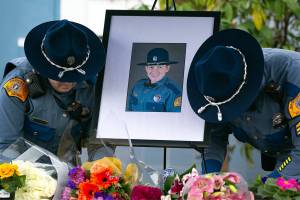Nathaniel Branden, acolyte and lover of Ayn Rand, dies at 84
Published 1:41 pm Tuesday, December 9, 2014
LOS ANGELES – Nathaniel Branden, writer Ayn Rand’s former devotee, lover and intellectual heir, who, after a bitter schism, moved to Los Angeles and became a bestselling author on self-esteem, has died. He was 84.
Branden, a psychotherapist, died Dec. 3 at his home in Los Angeles after a lengthy illness, said James Peron, a close friend.
He is widely credited with popularizing her philosophical teachings on the power of the individual and the perils posed by the unfettered state. Rand made many of her points in two blockbuster novels, “The Fountainhead” (1943) and “Atlas Shrugged” (1957).
Branden and Rand had a notoriously messy falling out – a split so tumultuous that she publicly denounced him and his then-wife, Barbara, and ordered his name stripped from the dedication of future editions of “Atlas Shrugged.” Today, groups of Rand followers, who through the years have included economist Milton Friedman and former Federal Reserve Chairman Alan Greenspan, are still at odds over Branden, whose stormy, on-again, off-again, 15-year affair with Rand was conducted with grudging consent from each of their spouses.
The author of 20 books including “The Six Pillars of Self-Esteem,” “Honoring the Self” and “The Psychology of Romantic Love,” Branden was an alienated 14-year-old in Toronto when he picked up his older sister’s copy of “The Fountainhead.”
“The author’s constructions, images, rhythms all took hold of me in some profound way,” he recounted in his 1989 memoir “Judgment Day: My Years with Ayn Rand.” “The style reflected a manner of processing experience, a way of being conscious, which I had never encountered before and yet that seemed intimately familiar.”
The epiphany stayed with Branden the rest of his life. As a star-struck teenager, he sent Rand a fan letter and never received a reply. When he was a 19-year-old psychology student at the University of California, Los Angeles, he tried again, ultimately receiving an invitation to coffee and cake at her house in the San Fernando Valley.
“I felt as if ordinary reality had been left somewhere behind and I was entering the dimension of my most passionate longing,” he wrote. “I reached for the doorbell, knowing without words and with irresistible certainty that nothing was ever going to be the same again.”
He was right.
In a few years, he would become Rand’s chief acolyte. She would call him “her lifeline to reality.” He would start the Nathaniel Branden Institute, devoted to systematizing her ideas and spreading them throughout the world in publications he edited and in lectures.
“He created an institution to get the philosophy out there,” said Ed Hudgins, a spokesman for Washington, D.C.-based Atlas Society a Randian group that takes a bow to “Atlas Shrugged” in its name.
In 1954, Branden and Rand, who was 25 years his senior, started their affair after summoning their astonished spouses to a meeting.
“We’re not Platonists,” Rand reminded them, in Branden’s account. “We don’t hold our values in some other realm, unrelated to the realm in which we live our lives. If Nathan and I are who we are, if we see what we see in each other, if we mean the values we profess – how can we not be in love?”
The couple announced they wanted to be alone in Rand’s New York apartment for one afternoon and one evening each week. Over the next few years, Rand’s husband, Frank O’Connor, started drinking heavily and Branden’s wife, Barbara, began having panic attacks.
Ultimately, both couples divorced; Branden and Rand went through their final, searing rupture after he revealed his intense, secret relationship with Patrecia Scott, a young model and aspiring actress he later married. She acted under the name Patrecia Wynand, a surname drawn from “The Fountainhead.”
Branden eventually renounced his vengeful zeal and became well-known as a writer offering guidance on achieving self-esteem.
“His is not the pretend self-esteem where kids aren’t allowed to keep score at soccer games and teachers give everybody an award just for showing up,” wrote Aptos, Calif., marriage and family therapist Joel Wade, a friend and student of Branden’s. “His work is about earned self-esteem.”
Born Nathan Blumenthal in Brampton, Ontario, on April 9, 1930, Branden changed his name when he was 24. “Why should I be stuck with someone else’s choice of name?” he wrote.
He received a bachelor’s degree in psychology from UCLA, a master’s degree from NYU and a doctorate from the California Graduate Institute.
His second wife, Wynand, drowned in 1997 in the Brandens’ backyard swimming pool. A third marriage, to Estella Devers, ended in divorce before Branden and Leigh Horton married in 2006.
In addition to his wife, his survivors include his nephews Jonathan and Leonard Hirschfeld.




